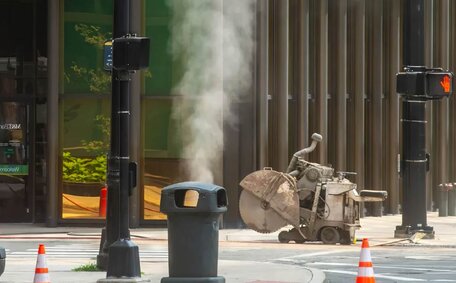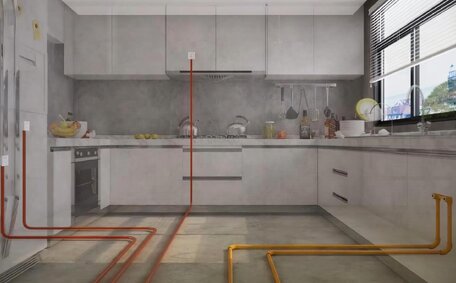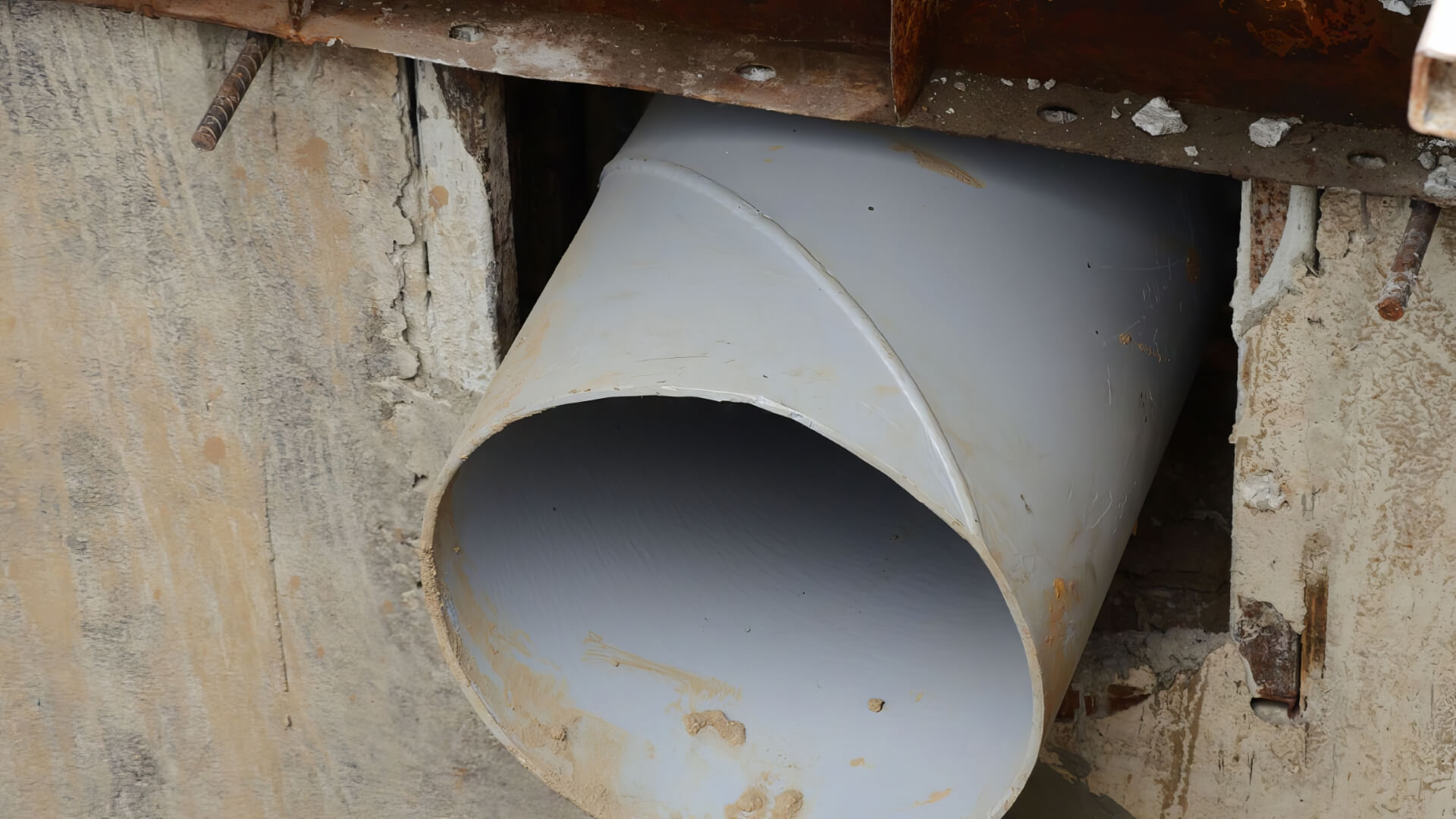Identifying signs of a gas leak
Several signs can indicate a natural gas leak in your property:
- Critical indicators of a gas leak include a pronounced rotten egg odour due to mercaptan—a chemical added by companies to natural gas for easier detection, even in small amounts.
- Unusual hissing sound, whistling or roaring emanating from a gas appliance.
- Dirt or debris blowing from a hole or crack in a gas line.
- Bubbles rising in wet areas like drains, ponds or wet grass near gas lines.
- Flames coming from the ground or burning above gas appliances.
- Browning or dying vegetation in an otherwise moist area near gas equipment.
- Unexplained mould or staining on walls near your meter or gas appliances.
- Significant unaccounted-for gas usage on utility bills, possibly indicating a malfunctioning of your appliances gas.
It’s crucial to respond promptly to any of these warning signs of a natural gas leak. Evacuate the building, stop using gas or operating any electronics or appliances, and promptly summon emergency services and the gas companies. A technician can investigate for potential exposure gas instances and confirm if repairs are needed before allowing safe building re-entry.
Fitting detectors capable of sensing carbon monoxide CO lends an additional layer of protection.
What a gas leak smells like
For leak detection, utility companies infuse natural gas with mercaptan, which emits a distinct 'rotten egg’ aroma. Natural gas used in our homes has no inherent smell, so adding this scent is a deliberate safety measure.
A foul, sulphur-like odour is a strong indicator of a gas leak in your house. Even a small gas leak might trigger suspicion, causing you to do suspect gas leak due to ethyl mercaptan mimicking the smell of rotten eggs at very low concentrations.
Trust your senses – if you detect the unmistakable scent of rotten eggs near gas heaters, it’s likely a gas leak; evacuate immediately.
Installing natural gas detectors offers additional safeguarding against unseen leaks, as they detect gas presence without relying on scent. Respond instantly, as that distinct scent often does gas signify a leak lurking within your dwelling.
Physical symptoms of gas exposure
Exposure to a natural gas leak can cause a range of physical symptoms, often appearing shortly after initial contact. Common symptoms induced by a natural gas leak include:
- Headaches
- Dizziness and lightheadedness
- Nausea
- Breathing difficulties like wheezing or shortness of breath
- Fatigue and lethargy
- Throat, nose and eye irritation - itchiness, burning sensations or redness
- Pale or bluish coloured skin
- Skin blisters or a rash in severe cases
Symptoms of gas exposure can intensify with prolonged exposure.
While brief exposure may cause temporary mild symptoms, prolonged exposure poses serious health risks, including respiratory, neurological, and cardiovascular consequences. Immediately vacate the area and seek medical attention if encountering symptoms your exposure gas leak in a possible or suspected area.
Early physical symptoms can signal potential gas leak complications. Do not ignore headaches or nausea near your gas appliances, as these can be warning signs of a gas leak. Step outside your dwelling to seek fresh air immediately during gas emergency situations and call emergency services to investigate.
Health effects of gas leaks
Gas leaks can have severe repercussions, Gas leaks can cause mild short-term symptoms and potentially fatal long-term health effects. Initial exposure often presents with flu-like symptoms, such as headaches, which can be confusing.
More prolonged exposure can also cause:
- Breathing problems - coughing, wheezing, shortness of breath
- Coordination issues and confusion
- Heart palpitations and chest pain
- Vomiting and diarrhoea
- Loss of consciousness
In extreme situations, extended exposure from a gas leak can result in co poisoning, leading to asphyxiation, respiratory failure, organ damage and even death. Those most at risk of health problems include babies, children, pregnant women, elderly people and those with existing health issues.
We recommend immediate attention to leaks in gas space cooking and heating systems, as they can lead to a higher risk of fires or explosions, resulting in severe burns and injuries. Depart promptly and obtain medical attention if a leak suspected – it’s a crucial safety measure. Installing CO detectors, particularly if you regularly use gas, provides an extra safeguard to prevent prolonged gas leak health impacts.
After gas exposure, it’s recommended to monitor health long-term.
Carbon monoxide poisoning
Gas carbon monoxide (CO) is one of the odourless and insidious products of combustion that poses considerable risks. Carbon monoxide is a hazardous combustion product of carbon-based fuels, including those used in water heaters, gas appliances, and LPG devices. Household appliances, especially poorly maintained gas stoves, are common sources of CO.
Exposure to CO, indicating a lack oxygen presence in your body, prevents blood from binding to red blood cells efficiently. Symptoms may initially resemble the flu but can worsen due to the monoxide which disrupts the body’s oxygen uptake, eventually leading to severe outcomes. They include:
- Headaches
- Dizziness, weakness
- Nausea
- Confusion and impaired coordination
- Shortness of breath
- Unconsciousness
Install carbon monoxide alarms to detect levels of this otherwise undetectable gas and protect your home. Brief exposure causes milder but still concerning symptoms warranting medical evaluation.
If an alarm sounds, evacuate immediately and call emergency services. Severe poisoning requires hyperbaric oxygen therapy to recover.
A breach in your gas lines can dramatically affect your risk of poisoning.
Comprehend this menace, maintain operational detectors, and take swift action do when an alarm resonates.
Other long-term health risks
Beyond common short-term symptoms, long term risks to health from gas leaks emerge with repeated or prolonged exposure.
Research has associated long-term exposure to natural gas leaks with increased risks, including:
- Neurological issues like headaches, dizziness and memory problems
- Respiratory conditions such as asthma and chronic obstructive pulmonary disease (COPD)
- Premature births or low birth weights for exposed pregnant women
- Certain types of cancers such as leukaemia and lymphoma
Outdoor natural gas breaches release air pollutants that can exacerbate respiratory conditions, compounding the threats posed by natural gas. They also contribute to climate change, which can occur by releasing methane, an extremely potent greenhouse gas.
While further research is required, these associations emphasise the importance of not ignoring persistent gas leaks. Get all leaks promptly inspected and repaired, enforce proper ventilation standards, and Stay vigilant with keeping gas safe. Protect your long-term wellbeing by preventing prolonged gas exposure.
What to do if you suspect a gas leak
If you suspect a gas leak, it is crucial to act quickly and responsibly to ensure safety:
- Immediately evacuate the area and switch off gas appliances, as gas leaks can cause serious harm. Avoid tampering with any electronics or devices as such actions might cause spark and ignite the escaped gas.
- Call 000 to alert local fire and emergency services if you recognise your symptoms or someone else is experiencing physical symptoms or need to shut off the gas due to an immediate danger.
- Contact your utility company and a licensed gas professional from teams such as Rouse Hill Plumbing for thorough inspections and repairs. For trusted advice, directly contact our expert expert plumbing professionals via our 24/7 emergency line, 1300 349 338.
- Do not re-enter the property until emergency crews and technicians confirm it is safe to do so. Our licensed gasfitter is skilled to find gas leaks and fix them in your property before allowing re-entry.
- Consider installing natural gas detectors for extra protection against leaks in your home, particularly for elusive sources. These detectors constantly monitor for any leak your home.
If you suspect a gas leak, immediately contact the trusted Rouse Hill Emergency Plumbing team at 1300 349 338. We have the training, experience and equipment to safely handle any gas emergency. When concerns arise, do not hesitate to get touch with us for immediate assistance.
Safety tips for preventing gas leaks
There are several key steps you can take to help prevent dangerous gas leaks:
- Annually inspect your gas line with qualified technicians to ensure optimal safety. Make sure they check pipes and connections for corrosion or loose fittings.
- Get your gas heater serviced annually. Professionals can clean, tune up and check that all components are in good working order.
- Repair or replace old faulty gas appliances that are damaged or not functioning correctly right away to mitigate risks. Faulty appliances, including a problematic gas stove, pipes and fittings substantially increase the risk a leak can pose.
- Ensure proper ventilation to prevent indoor gas accumulation and maintain healthy air quality, particularly around unflued heaters and meters. Good airflow reduces risk of unflued gas buildup.
- For added safety, install detectors that alert you to natural gas leaks in your household. They provide alerts when gas can accumulate.
- If you experience an unusual rotten egg smell, it could signal a gas leak your house, so take it seriously and act swiftly. This is a significant sign of a gas leak threatening your house, so evacuate and call emergency services immediately.
Proactive gas safety measures safeguard you and your family. Have Rouse Hill Plumbing assist with any inspections, repairs or installations needed to keep gas systems running safely. For a professional house call, reach out to us any time at 1300 349 338.
When to call a professional
It is crucial to engage a licensed plumber or gas fitter for any suspected gas leaks or exposure symptoms. Never attempt fix a gas breach on your own.
Contact emergency services immediately if you:
- Smell gas
- Hear hissing noises near gas appliances
- Be vigilant for any sign gas leak, such as dead vegetation or effervescing water
- Experience symptoms like dizziness, nausea or headaches
We recommend contacting our team of qualified gas fitters at Rouse Hill Plumbing should you suspect any gas leaks; we can handle the matter safely. Call us 24/7 at 1300 349 338 if you suspect a leak or have been exposed. We will inspect your home, confirm where the leak is coming from, make any necessary repairs, and ensure safety before allowing re-entry.
Annual inspections of gas heating systems aid early leak detection and prevent gas emergencies. Contact us to schedule maintenance for peace of mind knowing your gas systems are running safely.






